

.20210527084730.png)
- Modern, user-friendly interface
- Know where projects stand at a glance
- AI-powered task generation & automation
- Free 14-day trial, no commitment
“monday.com offers some of the nicest customizable dashboards in the industry.“ (Jan 2025)



.20210527084933.png)
- Collaborate with real-time chat features
- Automatic import from other productivity apps
- Track progress and goals


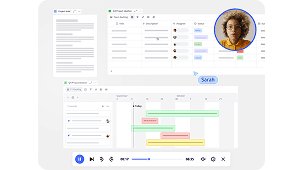
- 160+ integrations to connect teams & tools
- Flexible workflows that fit any project
- AI-driven collaborative workspace


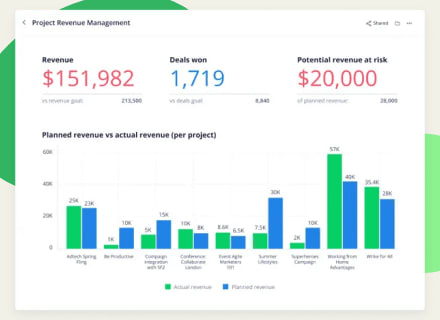
- Scalable project management software
- Advanced security and compliance
- Seamless integration capabilities


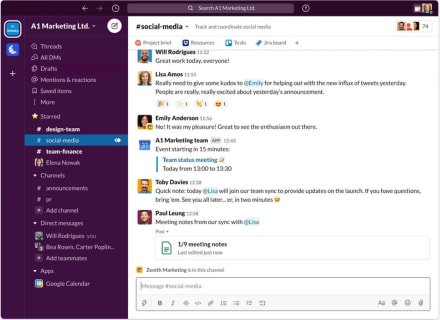
- Seamlessly integrates with over 2,000 apps
- Easy, user-friendly interface
- Quickly find messages and files with search


.20210527085313.png)
- All-inclusive project management system
- Marketing automation features
- Freemium plan available, upgrade any time


.20210527084730.png)
- Modern, user-friendly interface
- Know where projects stand at a glance
- AI-powered task generation & automation
- Free 14-day trial, no commitment
“monday.com offers some of the nicest customizable dashboards in the industry.“ (Jan 2025)

What is project management software and why does it matter?
Project management systems are essential digital tools that serve as your team’s command center. Whether you're coordinating a few freelancers or managing a global enterprise, these platforms help you:
Centralize communication, tasks, and timelines
Track progress and manage resources with precision
Prevent delays and miscommunication
Streamline workflows and boost productivity
In today’s remote-first world, online project management tools play a critical role in enabling seamless collaboration and centralized access. With features like dashboards, real-time tracking, and workflow automation, they provide the structure teams need to stay aligned and succeed, no matter where they are.
Key Insights
- Project management software centralizes teams while using AI to predict issues and automate work.
- Teams should assess specific needs when choosing PM software, considering size and integration needs.
- Top PM tools offer enterprise encryption, secure storage, and industry-standard security certifications.
Why are project management tools important in 2025?
Project management tools are now essential infrastructure for modern teams, keeping departments and time zones aligned on one platform. They support daily execution and strategic planning, helping leaders adapt quickly with real-time data.
With AI, these tools predict roadblocks, automate admin tasks, and improve decision-making. More than task trackers, they let you:
Launch projects faster with templates
Stay aligned through dashboards and automation
Manage time, budgets, and people in one place
Compare With Top10.com, Choose the Best for You
At Top10.com, we recognize the importance of thorough and accurate product and service reviews in guiding your choices. Our team, comprising editors and industry experts, conducts extensive research to provide comprehensive insights. Our content is continually updated to reflect the latest market trends, offering current information.
We provide a range of services including comparison lists and in-depth reviews, all tailored to meet your specific needs. Our goal is to empower you to make confident and informed choices.

How do I choose the right project management tool for my team?
There’s no single “best” project management software; your ideal choice depends on your team's size, structure, and the complexity of your projects. Whether you're running a startup, an interior design firm, or a growing enterprise, the right tool will streamline your project workflow and boost productivity.
Here’s what to consider when evaluating project management systems:
Project scheduling & task tracking – Use tools with calendar views, Gantt charts, or Kanban boards; ideal for scheduling software for small businesses and managing multiple projects
Budgeting & reporting features – Look for project budgeting software that helps monitor costs and optimize resource use
Team collaboration & task assignment – Choose project management software that can assign tasks dynamically and supports job tracking for individuals or teams
Platform flexibility – Opt for cloud-based project tracking solutions or project management software for Mac, depending on your team's needs
Workflow templates & dashboards – Tools with built-in project manager templates and customizable project management dashboards can improve clarity and save time
Integration support – Ensure your platform connects with key tools like Google Workspace, Slack, and Microsoft Teams
Usability & pricing – Affordable project management software, especially simple or easy project management tools, can accelerate onboarding and adoption
Whether you're looking for agile project management software, production management tools, or the best project management platforms overall, the goal is to match your tool to your project workflow. The right solution will help you manage tasks, timelines, and teams with confidence.

How is AI changing project management?
AI is quickly becoming the silent co-pilot in modern project workflow management, helping teams work smarter, not just harder. From automating task assignment and notifications (like in ClickUp and Asana) to predicting risks and delays (Wrike, Asana), AI is taking the guesswork out of planning and execution.
In platforms like monday.com, AI supports smart scheduling and resource balancing, while tools such as Smartsheet generate AI-powered reports and analytics to boost visibility and decision-making.
AI also helps:
Prioritize tasks based on urgency and workload
Automate status updates to keep everyone aligned
Allocate resources using real-time performance data
Provide insights across multiple projects for better portfolio management
For teams juggling fast-paced deadlines, especially in small business environments, these AI features reduce human error, improve forecasting, and keep your projects moving forward—on time and on budget.
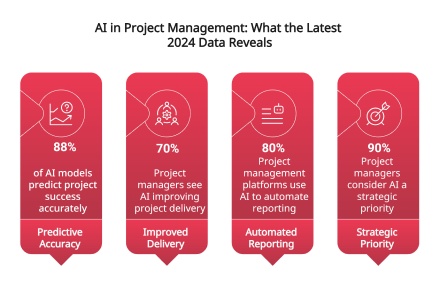
Source: gitnux.org
What is hybrid project management, and how does it support modern teams?
Hybrid project management blends the best of both worlds: traditional planning tools like timelines and Gantt charts, with Agile approaches like Kanban boards and sprints. It's a great fit for teams that need both structure and adaptability. This approach works especially well for:
Agencies and creative teams managing multiple client projects
Teams combining structured workflows with iterative development
Organizations needing customizable workflows to fit varied project types
The best project management platforms for hybrid work, like Wrike, monday.com, and ClickUp, support multiple methodologies with features like:
Gantt and Kanban views
Job tracker tools for individual and team tasks
Ready-to-use project manager templates
Tools for assigning tasks and tracking progress in real time
For remote and hybrid teams, these platforms become the operational hub. Cloud-based project tracking ensures updates are always current, no matter where team members are working from. With mobile access, shared project management dashboards, and integrated video conferencing, teams can collaborate seamlessly across locations and time zones.
What integrations should I look for in a project management tool?
The top project management software connects effortlessly with the tools your team already uses, eliminating the need to constantly switch between apps and helping you streamline your workflow.
Look for integrations with:
Communication tools like Slack, Microsoft Teams, and Zoom
Calendars and file management through Google Workspace and Outlook
CRMs and sales platforms such as HubSpot or Salesforce
Developer tools like GitHub or Bitbucket
These integrations help you:
Automate task updates and status changes
Reduce manual work and repetitive actions
Centralize team activity for easier collaboration and visibility
What are the pros and cons of switching to new software?
Switching to new project management software can offer major improvements, but it also comes with challenges. Understanding both can help you make a smoother transition.
Benefits | Challenges |
|---|---|
Better visibility into tasks and deadlines | Time needed for onboarding and team training |
More streamlined collaboration across teams | Adjusting to a new interface or workflow |
Real-time reporting and easier analytics | Potential migration issues and data transfer concerns |
Increased productivity through improved workflows | Change management hurdles, especially for larger teams |
To ease the transition, start with a small pilot team and choose simple project management software with:
A clean, intuitive UI
Helpful onboarding guides and tutorials
Strong customer support
Flexible, affordable plans - many top tools like Monday.com and ClickUp offer generous free tiers
Making the switch can be worth it when the software truly aligns with your team’s needs and simplifies everyday operations.
Is my data safe in project management tools?
Security is non-negotiable when choosing a project management platform. With teams handling sensitive data, deadlines, and client information, your software must offer robust, enterprise-grade protection.
Leading platforms like Wrike and Monday.com prioritize data protection with features such as:
End-to-end encryption to secure data in transit and at rest
Firewalls and intrusion detection systems to prevent breaches
Role-based access control so only the right people see the right data
Compliance with industry standards like SOC 2, ISO 27001, and GDPR
In addition, top cloud-based project tracking systems provide:
Secure cloud storage
Customizable user permissions
Audit trails to track user actions
Regular third-party security audits for transparency
For peace of mind, always choose a provider with clear, documented security practices because protecting your team’s data isn’t optional; it’s essential.
How do I choose the right project management software for my team?
Choosing the right tool is key to running projects smoothly. Follow these steps:
Evaluate requirements – Identify the features your team needs (e.g., mobile access).
Compare options – Weigh cost, functionality, and user reviews.
Test it first – Run a trial to ensure it fits your workflow.
Deploy & train – Set it up properly and onboard your team.
Review regularly – Track performance and update as needed.
How do I find software that fits my specific needs?
Start by identifying your biggest pain points.
Running a small business? Look for scheduling software with drag-and-drop calendars, automatic reminders, and easy task assignment.
Managing freelancers or remote teams? Choose individual project management software or agile project management software that’s flexible and customizable.
Industry-specific needs? Some tools offer job tracker functionality, project budgeting software, or ready-made templates for areas like interior design or production management.
No matter your workflow, the right solution should align with your processes, simplify collaboration, and scale with your team.
Comparing the top project management companies
Below is an up‑to‑date snapshot of leading project management software solutions, highlighting what each one does best, according to the latest 2025 reviews and feature comparisons.
Software | Most recommended for |
|---|---|
Monday.com | Best for highly customizable workflows and seamless team collaboration |
ClickUp | Best for an all-in-one productivity and project management solution |
Smartsheet | Best for teams familiar with spreadsheets who want scalable project management |
Wrike | Best for enterprises needing advanced reporting and resource management |
Miro | Best for visual collaboration and brainstorming with digital whiteboards |
Slack | Best for team communication and integrations with project management tools |
Hubspot | Best for project management paired with CRM and marketing automation |
FreshBooks | Best for project tracking with strong invoicing and accounting features |
Asana | Best for task and project tracking with a simple, user-friendly interface |
Jira | Best for agile and software development teams |
If you're evaluating our top 3 project management platforms, Monday.com, ClickUp, and Smartsheet lead the pack. This quick project management comparison highlights what sets them apart, whether you're after customizable workflows, an all-in-one productivity hub, or a spreadsheet-style interface. Use this guide to compare project management services quickly and confidently.
Monday.com vs ClickUp
In the Monday.com vs ClickUp matchup, Monday.com excels with its highly customizable workflows, visual dashboards, and ease of collaboration across teams. ClickUp, on the other hand, is an all-in-one solution that combines project management with docs, goals, and time tracking, making it ideal for teams that want everything in one platform.
Monday.com vs Smartsheet
The Monday.com vs Smartsheet debate comes down to flexibility versus familiarity. Monday.com offers an intuitive interface and a wide range of workflow automations, while Smartsheet shines for teams used to spreadsheets who want enterprise-grade scalability with built-in project management power.
ClickUp vs Smartsheet
ClickUp is designed for teams seeking an all-in-one workspace with advanced customization and productivity tools. Smartsheet focuses on providing a spreadsheet-inspired project management experience that scales well for enterprises. ClickUp suits startups and agile teams, while Smartsheet is ideal for organizations that rely heavily on structured, grid-based planning.
To see full details on pricing, features, pros, and cons, explore our Top 3 Picks below, where we break down Monday.com, ClickUp, and Smartsheet one after the other.
Our Top 3 Picks
- 1

 Exceptional9.8
Exceptional9.8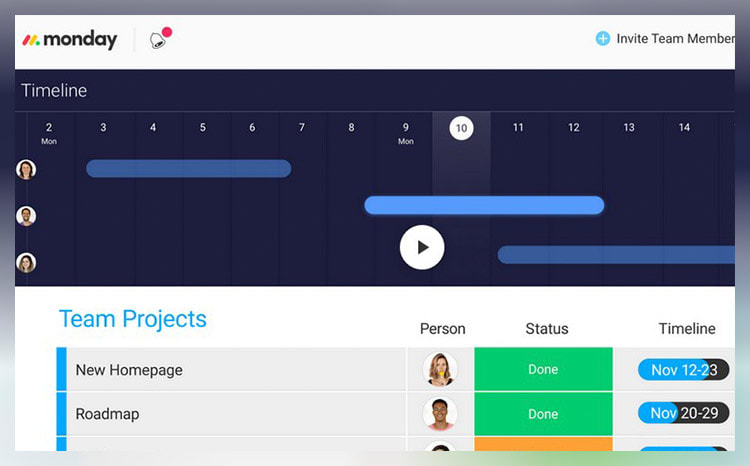 Efficient resource management tool
Efficient resource management tool- Price - From $27/month ($9/user/month)
- Team collaboration tools - Collaborative docs, updates, Zoom integration, whiteboards
- Free trial - 14 days
Free TrialEfficient resource management toolFree TrialRead monday.com Reviewmonday.com unifies your team’s tasks and processes into one user-friendly and visually pleasing interface.
As a work operating system, monday.com gives teams a clear view of responsibilities and deadlines, boosting transparency, accountability, and resource management. It features over 200 templates that can be customized with 20+ column options and various integrated apps. These tools simplify project setup and save time, helping you work more efficiently.
Additionally, you can tailor dashboards to provide detailed, team-specific views of tasks, project progression, and upcoming deadlines to enhance your team’s workflow clarity. Samyuktha Shivakumar, Global Marketing Operations Manager at Thoughtworks, reinforces this, stating that monday.com enables them “to budget the team’s time and efforts much more scientifically.”
Why we chose to review monday.com: monday.com tops our list for its combination of power, flexibility, and user-friendly design, making it ideal for even the most complex projects. It lets you seamlessly import data from spreadsheets and integrate it with your existing tools, eliminating manual data entry and freeing up time for other priorities.
Our experience: monday.com lets me implement processes that would’ve previously taken days or weeks within a few minutes. The platform’s communication tools, such as document sharing, comment annotation, and direct communication with task managers, improve collaboration within my team. The platform allows for excellent transparency for task management through easy-to-use sorting and color-coding methods.
monday.com Pros & Cons
PROS
Color-rich interface for improved organization and coordinationRobust list of supported, third-party integrationsDrag and drop project charting and timeline constructCONS
Pricing structure is fragmented and unclearCertain features (Gantt charts, timelines, etc.) are paywalled by higher-tier plans - 2

 Excellent9.3
Excellent9.3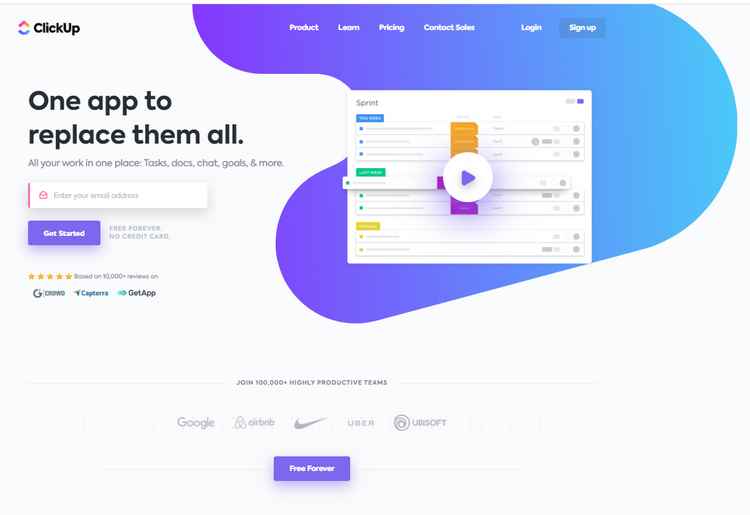 Visualize tasks and integrate apps
Visualize tasks and integrate apps- Price - From $7/month/user
- Team collaboration tools - Collaborative docs, real-time chat, file sharing, proofing
- Free trial - Free plan available
Visualize tasks and integrate appsRead ClickUp ReviewClickUp stands out with its diverse visualization tools, including Gantt charts, mind maps, and Kanban boards, which suit various project management styles.
These features make it easy to track tasks, monitor progress, and identify challenges.
The "Timeline View" offers a clear, linear way to plan schedules and create visual roadmaps. You can group tasks by assignee, priority, tags, custom fields, and more, allowing for a flexible and organized workflow. ClickUp also boosts team visibility with the "Pulse ClickApp," which shows who's online and their current tasks. Its global timer lets you track time automatically or manually, syncing seamlessly with your desktop, mobile, or browser.
Why we chose to review ClickUp: What sets ClickUp apart is its seamless integration with over 1,000 other apps, including Slack, GitLab, GitHub, and Webhooks. This capability makes it a go-to choice for development teams, allowing them to streamline their existing workflows.
Our experience: While trying out ClickUp, I was particularly impressed with ClickUp’s unique features, such as notepads, time tracking software, goal-setting tools, and pre-made templates. I also liked that I could use slash commands (typing “/” in any text field to trigger a command menu) to assign tasks, set due dates, or create subtasks quicker.
ClickUp Pros & Cons
PROS
AI CompatibleCan integrate with over 1,000 appsOffers numerous project tracking toolsCONS
Extensive feature list can be overwhelming for new usersSteep learning curve for beginners - 3

 Very good8.6
Very good8.6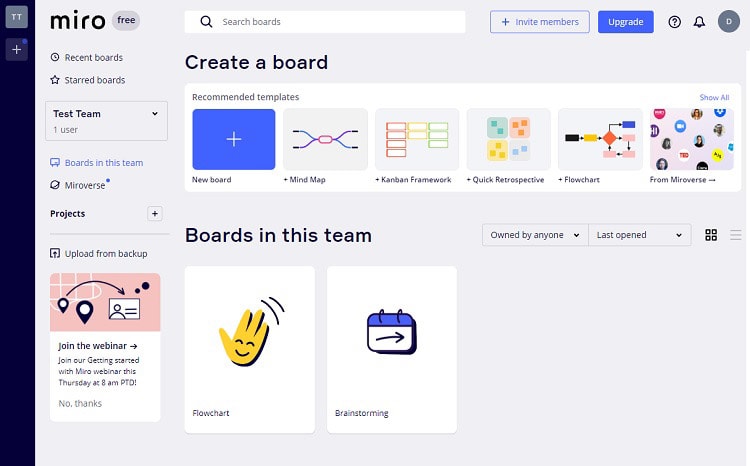 Powerful visual project management tools
Powerful visual project management tools- Price - From $8 per user, per month
- Team collaboration tools - Yes
- Free trial - No
Powerful visual project management toolsRead Miro ReviewMiro is a powerful project management app that enables you to create visual plans. There are thousands of templates to choose from, numerous third-party integrations, and a selection of collaboration tools.
It’s also a user-friendly option, and the main dashboard is intuitive and easy to navigate. Overall, I’d recommend giving it a try if you’re looking for a program that enables visual project management backed by real-time collaboration features.
Why we chose Miro: We chose Miro because of its suite of project management tools backed by powerful collaboration features and a huge template library.
Our experience: My favorite thing about Miro was how easy it was to sign up and use the program. Although it comes with loads of features, it remains one of the simplest project management apps I’ve seen.
Miro Pros & Cons
PROS
Very easy to get started with and useBuilt-in collaboration toolsA great selection of third-party integrationsCONS
Limited offline functionalityBasic mobile app



